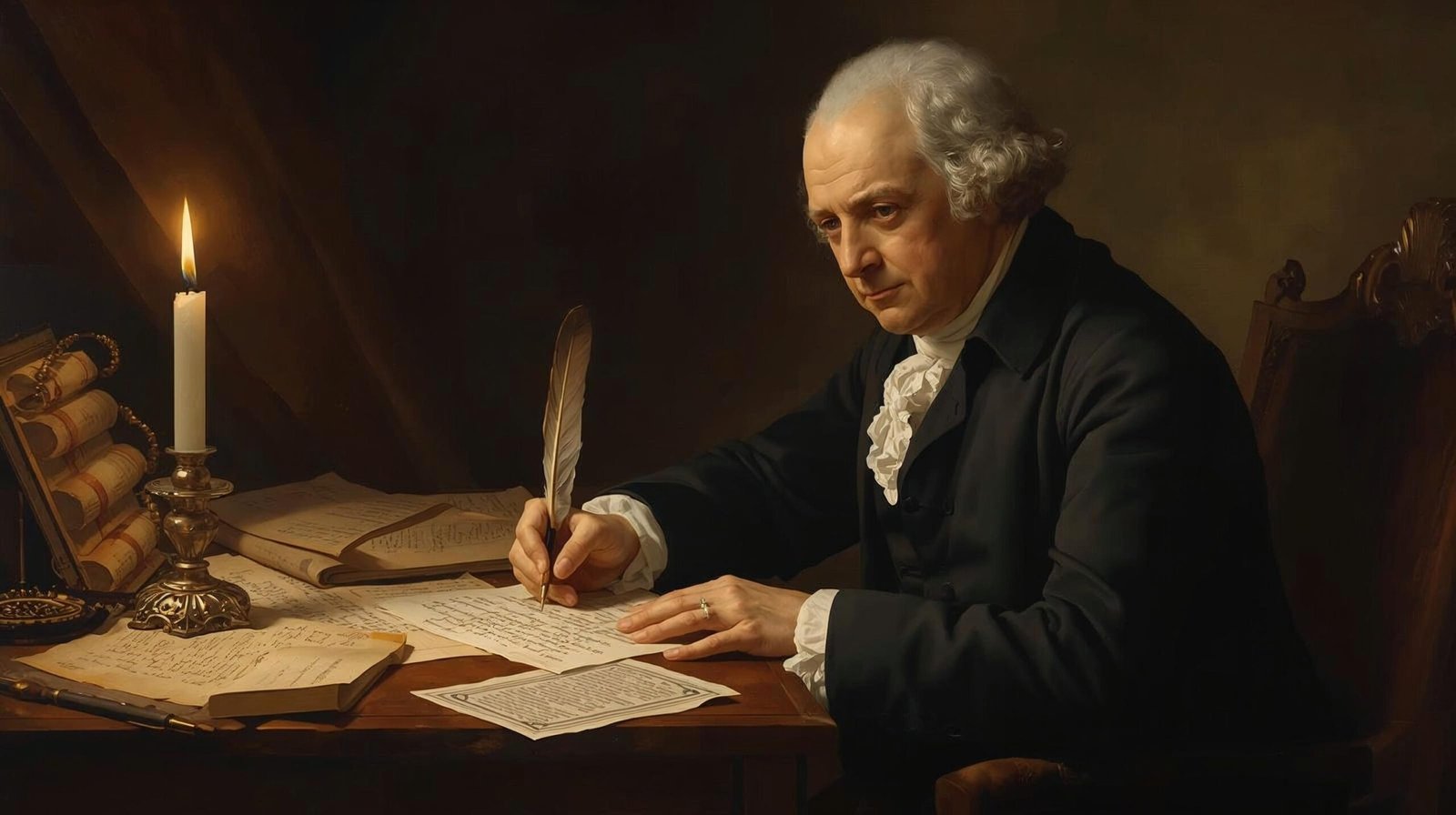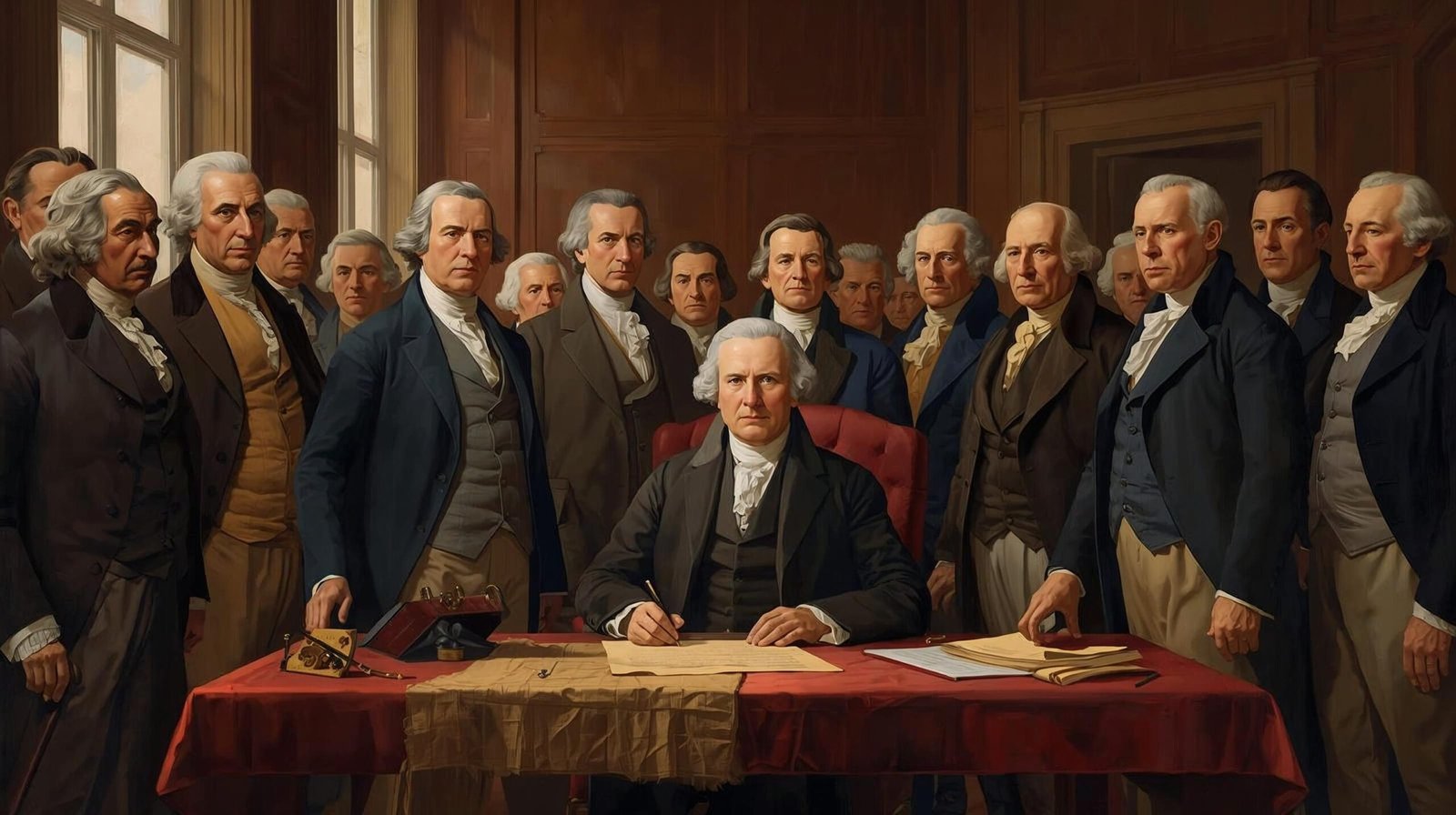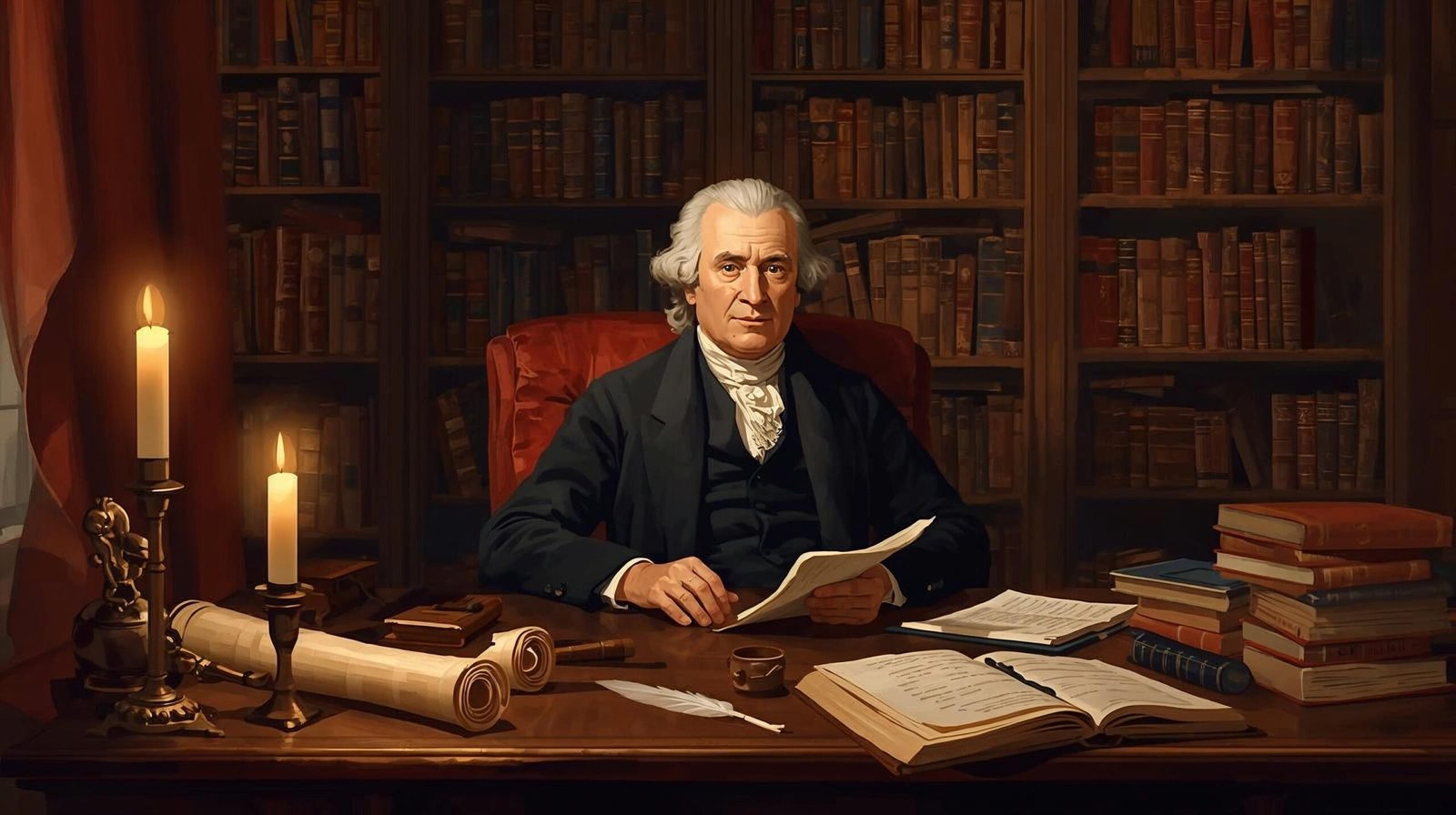John Adams Book Review: 11 Powerful Lessons from David McCullough’s Masterpiece
History is not merely the record of events; it is the collective memory of human triumphs and failures. Among the many towering figures who shaped the destiny of America, John Adams stands out as a statesman of extraordinary conviction, intellect, and integrity. His story has been immortalised by the celebrated historian David McCullough in the John Adams book, a Pulitzer Prize-winning biography that explores not only the public life of America’s second President but also the private struggles, triumphs, and sacrifices that defined him.
In this blogpost, we undertake a comprehensive review of the John Adams book, drawing attention to its depth, elegance, and lasting significance. We shall explore the central themes, chapter highlights, and the moral lessons readers may draw from the life of a man often overshadowed by his contemporaries yet indispensable in the founding of the United States.

The Legacy of John Adams
Before entering the intricacies of the John Adams book, one must first understand the extraordinary position Adams occupied in American history. Born in 1735 in Massachusetts, Adams rose from modest origins to become a lawyer, political philosopher, diplomat, and eventually the second President of the United States. His life intersected with monumental events—the drafting of the Declaration of Independence, the struggle for American liberty, the negotiation of peace with Great Britain, and the establishment of constitutional governance.
McCullough’s John Adams book paints Adams as a man of both brilliance and imperfection. Unlike the mythologised image of George Washington or the eloquent genius of Thomas Jefferson, Adams was a deeply human figure. He was blunt, occasionally irritable, and yet steadfastly devoted to his principles.
Why David McCullough’s Work Stands Apart
David McCullough, a two-time Pulitzer Prize winner, is widely celebrated for his narrative style that combines scholarly precision with storytelling artistry. The John Adams book is not a dry academic account but rather a sweeping, intimate biography that breathes life into its subject. McCullough’s prose captures not only the grand political dramas of the era but also the small domestic moments that reveal the essence of Adams’ character.
The strength of the John Adams book lies in its balance between the personal and the political. It portrays Adams as a husband deeply devoted to Abigail Adams, whose letters and counsel shaped much of his thought. It presents Adams as a father, a farmer, and a man who wrestled with doubts even as he helped chart the course of a new nation.
11 Powerful Lessons from the John Adams Book
The genius of McCullough’s John Adams book is not limited to recounting historical facts; it distills lessons that remain timeless. Here are eleven powerful takeaways that every reader may cherish:
1. The Value of Integrity in Public Life
Adams believed that public service was a trust, not an avenue for personal gain. The John Adams book highlights his refusal to compromise on principle, even at the cost of popularity.
2. The Power of Education and Ideas
A voracious reader and writer, Adams held that knowledge was the foundation of liberty. His lifelong devotion to learning, emphasised throughout the John Adams book, is a reminder that intellectual cultivation shapes great leaders.
3. Resilience in the Face of Criticism
Adams endured relentless criticism during his presidency, yet remained unwavering. The John Adams book illustrates how true leadership requires enduring hostility without surrendering to despair.
4. The Importance of Companionship
Perhaps the most touching aspect of the John Adams book is the portrayal of his partnership with Abigail. Their letters reveal a marriage rooted in mutual respect, love, and intellectual equality.
5. Duty Above Personal Ambition
Adams never sought power for its own sake. The John Adams book portrays him as a reluctant President who saw office as obligation rather than privilege.
6. The Balance of Diplomacy and Firmness
As a diplomat in Europe, Adams secured crucial treaties that ensured American independence. The John Adams book shows how he combined patience with firmness in negotiating with foreign powers.
7. The Cost of Leadership
Leadership extracts a price in health, peace, and family life. The John Adams book portrays the toll public service took on Adams, reminding us that greatness often demands sacrifice.
8. The Role of Faith and Morality
Though never sanctimonious, Adams held a deep belief in morality as essential for governance. The John Adams book underscores how personal ethics influenced his decisions.
9. The Imperfection of Heroes
McCullough does not shy away from Adams’ flaws—his vanity, his temper, his mistrust of political rivals. The John Adams book thus teaches that true greatness coexists with imperfection.
10. The Significance of Independence
Adams was one of the strongest advocates for American independence. The John Adams book makes clear that his vision of liberty was grounded in both reason and passion.
11. The Enduring Power of Legacy
Adams lived long enough to see his son, John Quincy Adams, become President. The John Adams book reminds us that the seeds of legacy are sown in dedication and perseverance.
A Deeper Look at John Adams as a Thinker
One of the most striking qualities of John Adams was his restless mind. From a young age, he cultivated a habit of constant reflection, journaling, and letter-writing. His correspondence reveals a man who wrestled with philosophy, theology, law, and governance. Unlike many of his peers, Adams did not present himself as an untouchable figure of destiny. Instead, he confessed doubts, fears, and frustrations with unusual candour.
This transparency makes him a compelling subject of study. Readers are introduced to a leader who was unafraid to confront his own vulnerabilities, yet also possessed the determination to rise above them. He saw virtue and morality not as abstractions but as active principles necessary for the survival of a republic. His belief that a free government depended on the character of its citizens remains one of his enduring legacies.

The Relationship with Abigail Adams
It is impossible to understand Adams without understanding his wife, Abigail. She was not merely a supportive spouse but an intellectual partner of immense influence. Her letters provide some of the most poignant insights into the era. In moments of separation during wartime and diplomacy, their correspondence sustained both of them and continues to inspire readers today.
Abigail often reminded her husband of the importance of considering the rights of women, most famously urging him to “remember the ladies” in the formation of new laws. While Adams did not embrace her request fully, her voice represents an early call for gender equality in the American experience. Their marriage, founded on respect and companionship, stands as one of the most remarkable partnerships of the Revolutionary generation.
Adams and His Contemporaries
To fully grasp the achievements of Adams, one must examine his relationships with other leading figures of the age. His connection with Thomas Jefferson was particularly complex. They began as allies in the fight for independence, drifted apart due to political rivalry, and eventually reconciled in one of the most extraordinary correspondences in history.
Their friendship is a testament to the power of dialogue even after bitter conflict. Both men died on the same day—July 4, 1826, the fiftieth anniversary of the Declaration of Independence—a coincidence that continues to astonish historians and readers alike. Adams also had difficult relationships with Alexander Hamilton and other Federalists, highlighting the inevitable divisions that accompany democracy.
The Statesman in Europe
Adams’ role in Europe is sometimes overshadowed by his political career at home, but it was of immense importance. As a diplomat in France, he often found himself in the shadow of Benjamin Franklin, who was more popular with French society. Yet Adams’ persistence and pragmatism proved essential. Later, in the Netherlands, he secured vital loans that kept the struggling American cause alive.
His work in negotiating the Treaty of Paris alongside Franklin and John Jay formally ended the Revolutionary War. Without his contribution abroad, independence might have remained an unrealised dream. This period also reveals Adams’ unyielding determination, his belief that America must stand on equal footing with European powers, and his resistance to flattery or compromise when the nation’s future was at stake.
The Presidency: Trials and Achievements
Adams assumed the presidency at a time of enormous uncertainty. The French Revolution had plunged Europe into turmoil, and America found itself torn between sympathies for France and Britain. Navigating neutrality required immense diplomatic skill.
His decision to pursue peace with France, despite widespread calls for war, was perhaps his greatest act of statesmanship. It was a deeply unpopular choice that cost him political capital, yet it spared the young nation from a potentially devastating conflict. This example illustrates his preference for long-term stability over short-term popularity—a quality often rare in politics.
Although his presidency was marred by controversies such as the Alien and Sedition Acts, his overall tenure demonstrated a commitment to national unity and cautious leadership during perilous times.

The Private Man
Beyond his political roles, Adams was a devoted farmer and family man. After leaving public life, he returned to Quincy, Massachusetts, where he enjoyed the simple rhythms of rural living. His later years were marked by deep reflection, prolific writing, and correspondence with old friends and rivals.
This retirement phase is significant because it allowed Adams to witness the growth of the republic he had helped to create. He lived long enough to see his son, John Quincy Adams, ascend to the presidency, a moment of immense pride tempered by his awareness of the burdens of leadership.
McCullough’s Literary Style
The power of David McCullough’s biography lies not only in the facts it presents but in the way it presents them. His prose is elegant yet accessible, scholarly yet narrative-driven. He avoids heavy jargon, instead weaving historical events into a story that reads like a novel without sacrificing accuracy.
McCullough’s ability to humanise his subject allows readers to step into the world of the eighteenth century and experience it vividly. He pays careful attention to details of daily life, drawing on letters, diaries, and contemporary accounts to recreate scenes with authenticity. This style is particularly valuable for modern readers, as it transforms history from a distant abstraction into a living reality.
Lessons for Modern Leadership
The story of Adams offers lessons that extend beyond politics. His life demonstrates the importance of resilience in the face of adversity, the value of honesty in leadership, and the necessity of balancing ambition with humility.
For business leaders, educators, or anyone in positions of responsibility, the principles he embodied remain instructive. His insistence on moral responsibility reminds us that leadership is not merely about efficiency or power but about stewardship and the well-being of others.
The Human Dimension of History
What makes this biography so compelling is its insistence on portraying history as lived experience rather than abstract chronology. We encounter Adams not as a marble statue but as a flesh-and-blood individual with hopes, fears, and contradictions. This approach reminds us that history is shaped by human beings, each wrestling with the same emotions and uncertainties that we encounter today.
Such a perspective deepens our understanding of the past and strengthens our connection to those who came before us. It also warns against idolising leaders without recognising their flaws, for it is in the interplay of strength and weakness that true character is revealed.

Broader Impact on Historical Writing
The success of McCullough’s biography influenced how many people view historical writing. By combining rigorous scholarship with compelling storytelling, he demonstrated that serious history could also achieve mass appeal. His work has encouraged countless readers to take interest in figures who might otherwise have remained confined to academic study.
Moreover, the book’s impact extended into popular culture, inspiring adaptations such as the HBO miniseries that introduced Adams to new generations. In doing so, it contributed to a renewed appreciation for the role of biography in preserving national memory.
The Relevance of Adams’ Vision Today
In an era of global uncertainty, political division, and social transformation, the vision of Adams remains pertinent. His warnings about the fragility of liberty, the dangers of partisanship, and the need for civic virtue echo with undiminished force. He understood that the experiment of democracy required constant vigilance and commitment from both leaders and citizens.
By revisiting his life through the lens of modern challenges, readers gain perspective on their own responsibilities within society. The struggles of the past become guides for navigating the dilemmas of the present.
Chapter-Wise Insights from the John Adams Book
David McCullough’s biography is structured to follow Adams’ life chronologically, yet it reads like an unfolding epic. Let us briefly examine the stages of this journey:
-
Early Life and Education – The John Adams book captures his transformation from a farmer’s son into a Harvard-educated lawyer.
-
Role in the Revolution – The drama of independence, vividly portrayed, shows Adams as a determined advocate for separation from Britain.
-
Diplomatic Missions – In France and the Netherlands, Adams navigated intrigue and secured crucial alliances, as detailed in the John Adams book.
-
Vice Presidency and Presidency – McCullough describes the challenges Adams faced as the first Vice President and then as President during turbulent times.
-
Retirement and Reflection – The closing chapters of the John Adams book highlight his correspondence with Jefferson and his enduring wisdom until his death in 1826.
Why the John Adams Book Remains Relevant Today
Though rooted in the eighteenth century, the John Adams book resonates in the present age. At a time when public life often suffers from cynicism, McCullough’s portrait of Adams reminds us of the nobility of service, the necessity of principle, and the enduring relevance of moral leadership. It is a biography not only of a man but of the ideals upon which a nation was built.

Conclusion
The John Adams book by David McCullough is more than a biography—it is an enduring meditation on duty, sacrifice, and the human spirit. Through meticulous research and elegant prose, McCullough has illuminated the life of a man whose courage and conviction shaped the foundation of America. Readers who seek to understand not merely history but the values that sustain civilisation will find this book indispensable.
For those who wish to explore great biographies that inform and inspire, the John Adams book is a treasure beyond measure. It reminds us that even in the face of imperfection, a life devoted to principle leaves an immortal mark upon the world.
FAQs on the John Adams Book
Q1. Who is the author of the John Adams book?
The John Adams book is written by David McCullough, a Pulitzer Prize-winning historian known for his rich narrative style.
Q2. What is the main theme of the John Adams book?
The central theme is the life and legacy of John Adams, emphasising his role in American independence, his presidency, and his devotion to principle.
Q3. Is the John Adams book suitable for general readers?
Yes. Though deeply researched, the John Adams book is written in an accessible, engaging style that appeals to both scholars and general readers.
Q4. How long is the John Adams book?
The biography is approximately 750 pages in most editions, offering a detailed yet compelling account of Adams’ life.
Q5. Why should one read the John Adams book today?
Because it offers timeless lessons in leadership, resilience, and the enduring importance of principle in public life.
Final Words
At shubhanshuinsights.com, we believe that great books are not merely to be read but to be lived. The John Adams book is a shining example of literature that informs, inspires, and elevates the human spirit. May its lessons continue to illuminate the path of readers in search of wisdom and purpose.